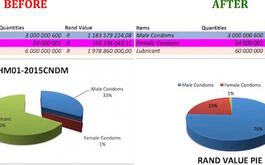COVID-19 Vaccine Wars
Section 12(2)(c) of South African Constitution: Everyone has the right to bodily and psychological integrity, which includes the right … (c) not to be subjected to medical or scientific experiments without their informed consent.
The Chronic Wounds: Money-spinner!
This new series will examine the costs and associated burdens of improper clinical and medical practices from ‘snake-oil’ suppliers to surgeons who are too fast and reckless with their scalpels.
Glyphosate: Monsanto & EPA Under The Scope
Questions about EPA-Monsanto collusion raised in cancer lawsuits. If public officials can easily collude with big corporations, to whom should the public turn?
Flying Gas Chambers
TOXIN ON BOARD! Frequent international flyers and aircrew, be very afraid. And if you are pregnant be even more afraid [for yourself and for your unborn child]. This is not a drill. If you have been exposed to the so-called WHO-insecticide,…
Blood In Their Hands
Did Sir Alexander Fleming, the discoverer of penicillin, ever imagine a scenario where deliberate, profit-driven underdosing would be a contributing factor to antibiotic resistance?
Predatory Pharmaceuticals
Hard facts and solid data prove how some pharmaceutical companies continue to line their bank accounts behind a wall of secrecy and deep conspiracies to rig public tenders
Protection or Enthnopiracy?
Is government protecting the traditional medicine knowledge of our Indigenous people, or imposing a state-run ethnopiracy scheme for big pharma and the biotech Industry?
Big Pharma in Ransom Tender
There is less mystery about why big pharma is successfully holding the department of health to ransom, uSpiked Investigative Team reveals.
Condom Rush 3.0 The Looters
From unusual deals involving multimillion submarines contract in exchange for a condom factory to schemery by unscrupulous suppliers, in South Africa condoms come with complex baggage.
Blacklisted Suppliers Threaten Legal Path
The masterminds of a ‘fronting’ scheme that reaped lucrative public tenders have threatened to sue uSpiked over our damning revelations.
South Africa’s Untouchables
Officials at the Department of Health have shown blatant contempt for the trust placed in them by the public and Treasury. They seem to have an entrenched system and nobody can halt the gravy train
Blacklisted Contractor Gets R776.8m Contract
How could a blacklisted contractor win a public tender? Our team strips the other form of fronting in business that is never discussed.
Prenatal Supplements Are Out Of Reach
How healthy are our unborn children? Many babies are now at risk of avoidable birth defects due to widespread shenanigans at health department.
Are You Pregnant? The State Has Plan B
This little pill would have passed as yet another essential drug that must be procured to keep the nation healthy.
Condom Rush 2.0
The condom contract bungle at the Department of Health has left officials in a pickle. Our investigation halted a dubious scheme to defraud the public of billions of rands
The Dark Side of HPV Vaccines
Race-based medicine is a discussion many scientists like to avoid, even though there’s consensus that race and ethnicity count in the distribution of infectious diseases
The R3.6 billion Off-Tender Vaccines Deal
Set up to replace the failed State Vaccine Institute, is The Biovac Institute an example of a public private partnership gone wrong for lack of transparency?
The Cost of SA’s Diabetes Tsunami
Smarter procurement practices are required to effectively deal with the rising costs of managing complications of pandemic diseases.
Condom Rush
As condoms suppliers rush to share the multi-billion rand pie, a closer look reveals a system that aids capital flight.
Walking The Tight Rope Of Tuberculosis Treatment
With TB infections on the rise in South Africa, there is one perturbing mystery of government’s approach to the runaway cost of TB treatments.
Aspen To Supply R17.5m Worth Of Toxic Drug
It is six years since World Health Organisation recommended the phasing out of Stavudine, why is the Department of Health spending millions on the toxic ARV?
Meet SA’s Pharma Suppliers
The line between legality and morality is getting thinner. Can the latter triumph? This is one of troubling questions, as we continue to assess the inner details of the pharmaceuticals procurement process at the Department of…
1,146 Ways To Spend R29 billion
Considering the critical drugs shortages in South Africa’s public hospitals, the R29b worth of pharmaceutical contracts issued by the Department of Health raise eyebrows.
The Experts - Undisclosed Agendas
Experts presenting their views on Medical Innovation Bill to the parliamentary portfolio committee on health did little to mask self-serving interests. But who can challenge the learned professors?
























